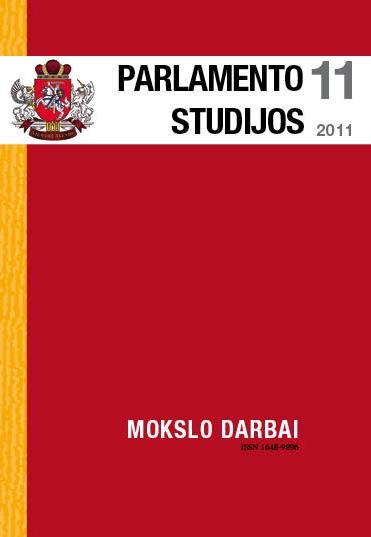Seimas’ Relations With Parliamentary Archive
DOI:
https://doi.org/10.51740/ps.vi11.291Keywords:
archive, the Law on Archives and Documents, history, parliamentary scrutiny, SeimasAbstract
The aim of the article is to answer the question how the parliamentary archive could and should reveal the function of document dissemination.
The Seimas Public Relations Strategy developed in 1998 names “the key principle of the strategy: the Seimas is an open institution of public authority”. It further emphasises that “we need to seek publicity of the institution in deliberating, declaring and passing decisions, transparency of the authority and the authorities, as well as interinstitutional cooperation”.
On the one hand, this primarily implies the preparation of relevant information on events in the Seimas and dissemination thereof to various concerned groups. Certainly, in these cases a politician, an information drafter, a media representative or the audience do not consider how a number of documents originate from one document and how the entire Parliament becomes the media, i.e. the communicator of relevant news.
On the other hand, when presenting the overview of the situation in 1998 from the internal communication aspect in the Seimas, the Office of the Seimas, the above referred strategy also writes about the archive, quote: “The Seimas Archive does not store historical material (does not assign and is not assigned this function); there are not all documents even since 11.03.1990, as well as important act drafting documents, e.g. the doc[uments] of the working group on [drafting of] the 1992 Constitution; generally, the archive is not considered to be an important unit in the Office of the Seimas”.
The concept of the archive as the unique, indelible system of documents has been developing very slowly. How do a parliamentarian and a servant of a parliamentary institution see their work in this system? Naturally, a servant of a parliamentary institution might and should be obliged to preserve appropriate documents, yet it is much more difficult to inculcate on a politician the role of an archive as a necessary and reliable keeper of the document bank.
An archive can carry out this function of the basis, when it evidences that society is actually participating in the processes of election and governance. Namely an archive can reveal the efficiency of parliamentary scrutiny.
It would be useful if the International Council on Archives recommends to the parliaments distinguishing their archives as completely separate and autonomous subjects. This recommendation is particularly advisable to be deliberated by the Lithuanian legislative and the Lithuanian Parliament. It would be necessary to recommend, while attracting the attention of democracies to the aspect of the formation of political culture, that the documents of all parliamentary structures (including parliamentary factions) are stored in the parliamentary archive upon closing of the term of office. The author would like to recommend to the Seimas establishing the Seimas Archive instead of the Archive Unit so that the Seimas Archive is assigned the functions of document search, acquisition, storage and research and to recommend envisaging funds in the budget of the Office of the Lithuanian Parliament for the search and acquisition of archival documents. Of course, to recommend amending the Law on Archives and Documents by stipulating an obligation to the politicians holding the posts paid from the state budget to formalise their relationship with the state archive.








 The metadata of the scholarly journals and publications of the Lithuanian National Martynas Mažvydas Library is distributed by
The metadata of the scholarly journals and publications of the Lithuanian National Martynas Mažvydas Library is distributed by 